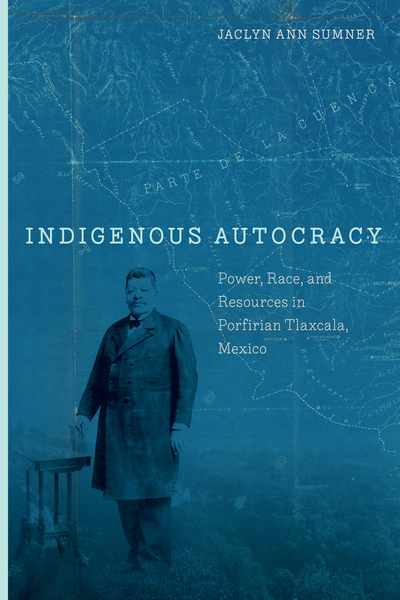
November 2023
244 pages.
from $28.00
Paperback now $14.00 (50% off)
Hardcover ISBN: 9781503636279
Paperback ISBN: 9781503637399
Ebook ISBN: 9781503637405
When General Porfirio Díaz assumed power in 1876, he ushered in Mexico's first prolonged period of political stability and national economic growth—though "progress" came at the cost of democracy. Indigenous Autocracy presents a new story about how regional actors negotiated between national authoritarian rule and local circumstances by explaining how an Indigenous person held state-level power in Mexico during the thirty-five-year dictatorship that preceded the Mexican Revolution (the Porfiriato), and the apogee of scientific racism across Latin America.
Although he was one of few recognizably Indigenous persons in office, Próspero Cahuantzi of Tlaxcala kept his position (1885–1911) longer than any other gubernatorial appointee under Porfirio Díaz's transformative but highly oppressive dictatorship (1876–1911). Cahuantzi leveraged his identity and his region's Indigenous heritage to ingratiate himself to Díaz and other nation-building elites. Locally, Cahuantzi navigated between national directives aimed at modernizing Mexico, often at the expense of the impoverished rural majority, and strategic management of Tlaxcala's natural resources—in particular, balancing growing industrial demand for water with the needs of the local population. Jaclyn Ann Sumner shows how this intermediary actor brokered national expectations and local conditions to maintain state power, challenging the idea that governors during the Porfirian dictatorship were little more than provincial stewards who repressed dissent. Drawing upon documentation from more than a dozen Mexican archives, the book brings Porfirian-era Mexico into critical conversations about race and environmental politics in Latin America.
About the author
Jaclyn Ann Sumner is Associate Professor of History at Presbyterian College.
"Indigenous Autocracy reveals how Tlaxcala's Próspero Cahuantzi managed to stay in power for twenty-six years as one of Mexico's few 'full-blooded' Indigenous governors. Compellingly arguing that the secret to Cahuantzi's political longevity was a deft and selective use of his indigeneity and its signifiers, the book effectively integrates cultural, political, and environmental history to revise our understanding of Porfirian Mexico."
—Mikael Wolfe, Stanford University
"Reconstructing in painstaking detail the life and times of a powerful Indigenous governor, Jaclyn Ann Sumner gives us a heady combination of predictable elite thuggery and development with far less predictable racial politics, regional autonomy, development, environmental consideration, and even populism. The result is credible, readable, and professionally unmissable."
—Paul Gillingham Northwestern University
"Sumner's Indigenous Autocracy masterfully demonstrates how bringing together research on race, the environment, technology, and local history can illuminate broader changes in identity politics, nation-state construction, development, and power."
—Justin Castro, H-Environment
"This is a well-researched lens into Mexican politics, society, and culture during a critical period in Mexico's history. Recommended."
—E. C. Rothera, CHOICE